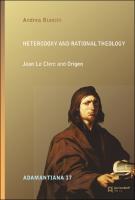Heterodoxy and Rational Theology
Jean Le Clerc an Origen
Author(s)
Bianchi, Andrea
Collection
European Research Council (ERC); EU collectionLanguage
GermanAbstract
Despite his controversial reputation, Origen of Alexandria (185–253) was very much present in 17th- century religious debates. His official condemnation by the Church was a stain on his theological and exegetical reputation, yet his work remained a source of inspiration for some. For others, he was a heretic to be refuted. In Jean Le Clerc (1657–1736), a Swiss born Dutch Biblical scholar and literary journalist, we find elements from both camps although their opinions are not given equal weight, and he made a clear-cut assessment of Origen’s condemnation. As a member of the Arminian Church, Le Clerc had to defend his religious affiliation throughout his life, especially rejecting the predominating Reformed views on such hotly debated topics such as human freedom, divine agency and predestination. He also had to protect his theological reputation from other accusations of heterodoxy, especially Socinianism. Surprisingly, Origen became a key ally in Le Clerc’s struggle, despite the fact that he had to utilise the Alexandrian’s thought in nuanced ways and to communicate it with great care in order to discourage frontal attacks on himself based on Origen’s reputation and work.
Keywords
Jean Le Clerc; Origen; Arminian Church; Human Freedom; Divine Agency; PredestinationDOI
10.17438/978-3-402-21812-9ISBN
9783402137338, 9783402137345, 9783402137338Publisher
Aschendorff VerlagPublisher website
https://www.aschendorff-buchverlag.de/Publication date and place
Münster, 2022Imprint
Aschendorff VerlagSeries
Adamantiana, 17Classification
Christianity
Theology


 Download
Download